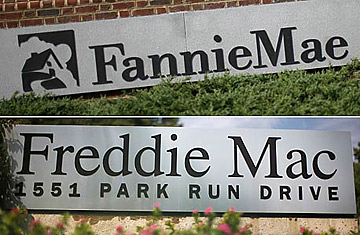
Speaking at an annual conference of real estate editors, James Lockhart, head of the Federal Housing Finance Agency, said on Thursday the government shouldn't run Fannie Mae and Freddie Mac. Lockhart should know. He leads the agency that has been doing just that since last September, when the giant mortgage insurers were put into government conservatorship. Lockhart said his experience with Fannie and Freddie as well as helping to run other government insurance programs taught him that government ownership for these types of companies doesn't work.
"What I have seen is that government insurance programs are high-risk," said Lockhart. "It is often difficult in a political environment to calculate or charge an actuarially fair price." It is essentially a moral-hazard argument. Lockhart believes that the government will never be able to accurately price the guarantees that Fannie and Freddie offer mortgage lenders and investors. And as long as the government is offering that insurance too cheap, banks will be encouraged to make loans they shouldn't. And that will lead to more losses for Fannie and Freddie down the road.
If the bottom lines of Fannie and Freddie are any guide, the government seems to be doing a less than stellar job with the two mortgage-financing giants. In the first three months of this year alone, Fannie and Freddie lost a combined $33 billion; the government has pumped $85 billion in equity into the two companies to keep them afloat. What's more, the Treasury and the Federal Reserve have purchased more than $700 billion of Fannie and Freddie mortgage securities. Still, the turnaround of the two companies is not yet in sight. Lockhart said the bottom lines of Fannie and Freddie probably won't rebound for another year or two.
Now that the White House has laid out its plans for financial regulation, figuring out what to do with Fannie and Freddie may be the next task at hand. This week President Obama said he plans to have a proposal on what to do with the mortgage insurers by early next year. Fannie and Freddie, which guarantee to pay lenders and investors in the event that a borrower defaults, were set up by Congress. But while they were run as private companies, it was long understood that if the companies ran into trouble, the government would step in to save them, which is exactly what happened.
That ultimately left the job of turning around the two troubled giants to Lockhart, who was formerly the chief operating officer of the Social Security Administration. He says he meets with senior executives of both companies once a week; his staff interacts with Fannie and Freddie every day. Lockhart believes that the government has done a better job of running Fannie and Freddie than the bottom lines of the two companies suggest. Most of the losses suffered by the mortgage giants, he notes, resulted from mortgages that Fannie and Freddie backed before they were taken over. Furthermore, part of the mandate of the current conservatorship has been to use Fannie and Freddie to stabilize the mortgage market and reduce foreclosures. Fannie and Freddie now back nearly 70% of all the mortgage loans made this year, a sign that the two companies have been active in helping people get new loans or refinance existing ones. And mortgage rates, though up recently, are down from where they were when the companies were taken over, a further indication that their added liquidity is helping. Foreclosures continue to rise, but the government's latest plan to modify mortgages seems to be making some headway.
Still, for the long haul, Lockhart thinks it would be a bad move to permanently nationalize the two firms. Instead, he prefers returning them to the private market, perhaps in the form of something close to a public utility that would charge a fee to homeowners or lenders to subsidize lower mortgage rates.
Congressman Paul Kanjorski, a Democrat from Pennsylvania who heads up the House of Representatives subcommittee that oversees Fannie and Freddie, backs a plan that would break up the firms into as many as 15 smaller companies. As with public utilities, he thinks the government could regulate what these firms could charge and how much they could make. That would limit the risk-taking and excess use of leverage that caused the two firms to collapse. "I think it would be bad for the mortgage market to get rid of them completely," said Kanjorski, who also spoke at the conference on Friday morning. "But if they were smaller, perhaps next time we won't be in the situation where these firms are too big to fail."
Others think at least some portion of Fannie and Freddie may need to be nationalized. Congressman Barney Frank told the same group of reporters that it might make sense to nationalize the duties of Fannie and Freddie that have to do with promoting affordable housing. The job they do of supporting the mortgage market could be returned to the private sector. "The two roles should be separated," says Frank, a Democrat who heads the House Financial Services Committee.
Lockhart, for his part, agrees that a breakup may be the answer. But no matter what is done, Lockhart believes that fixing Fannie and Freddie is essential to fixing the real estate market. In his speech, Lockhart said, "It is crucial that we get the restructuring done right for all present and future homeowners and renters."
